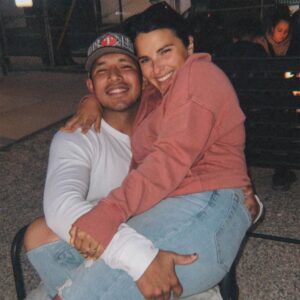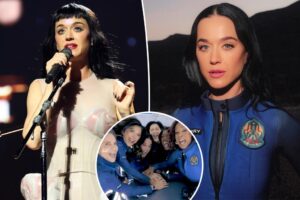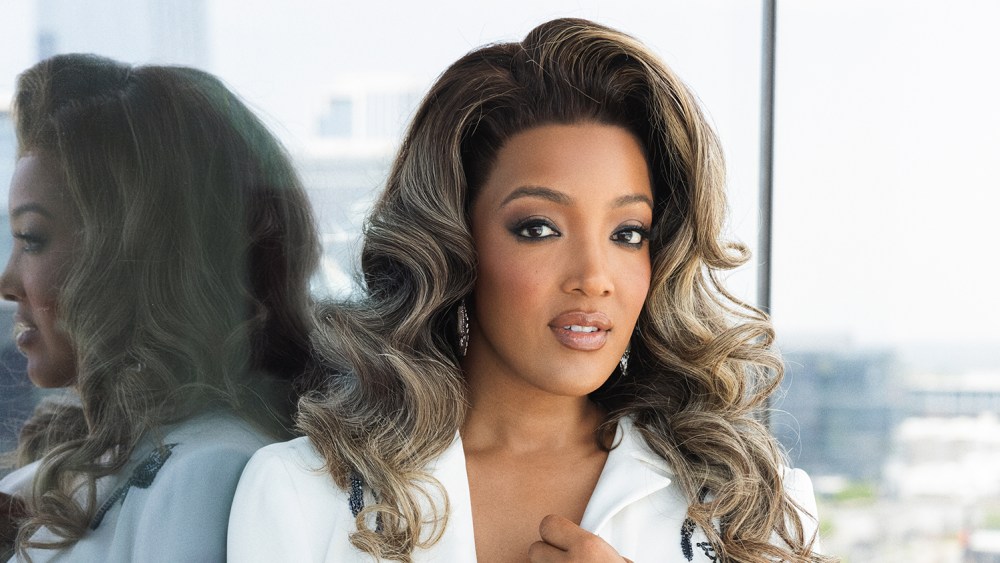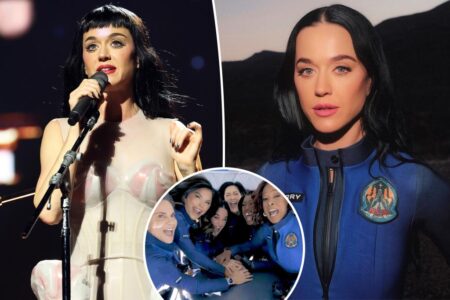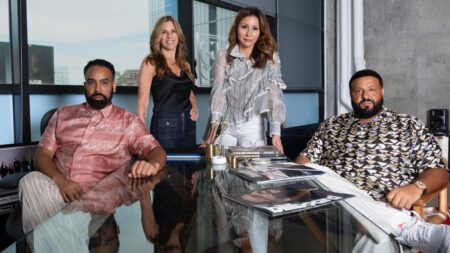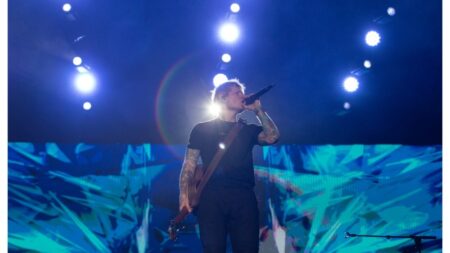Mickey Guyton has a way of dazzling everyone in her path — including, maybe most of all, her fellow top-ranking musicians. Take Sheryl Crow, who recently shared the stage with her at the taping of a network special celebrating Ringo Starr at Nashville’s Ryman Auditorium. Guyton participated with Crow, Starr and the other guests in some group sing-alongs, but it was when she stood alone, tackling a fairly obscure Ringo ballad called “You Don’t Know Me at All” (which she has subsequently released as a single), that Crow’s ears really perked up. “All of us were fine,” Crow says, speaking of the all-star cast’s performances. “But she was unbelievable. You could feel the whole room change when she sang.”
And she’s the kind of light that shines in virtually any setting. Says Leslie Fram, one of Nashville’s leading behind-the-scenes ladies: “Mickey is one of the first artists I met when I moved to Nashville, and she’s grown into one of the most versatile artists I know. Who else can perform the national anthem at the Super Bowl, host the ACM Awards, cover Tina Turner for the Rock and Roll Hall of Fame ceremony and perform with everyone from Gladys Knight to Metallica?”
Victoria Stevens for Variety
The Texas native is a woman for all seasons, and conceivably all genres. So as much as country music has done for her, she has arguably done more for it, by choosing to stick around and still identify first and foremost with country, when that identification continues to pose obvious challenges for her. In what is still very much a white man’s world as far as hit artists go, there’s no need to remind anyone that Guyton started with two strikes against her: being female and being Black. But she continues to be a beacon to women and people of color who look up to her as a primary example of someone who has managed to make the box bigger. And she also represents something from the format’s past that can seem like a lost art in today’s post-bro country: the thoughtful belter.
When it’s pointed out to her that she’s one of the most respected women in Nashville for her talent, perseverance and mentoring, Guyton says, “I appreciate that,” and adds, “It’s crazy to even think that I’m admired like that, when I’m just wanting everybody to feel loved and accepted and seen.”
The camera loves her, too. If the hit parade were based solely on the adoration of TV bookers… “then I’d be freaking winning,” she says with a laugh.
Actually, it’s difficult to think of her as anything other than a gold medalist in any relevant category except country radio — which has stubbornly resisted turning any of her string of great singles into an airplay hit. But there’s a reason why Guyton is the person producers call first for national TV moments that are either celebratory or require some gravity. She has sung the national anthem not just at the ’22 Super Bowl but at NBA and U.S. Open championship games, as well as the World Series. She brought the Times Square ball down this past New Year’s Eve, singing John Lennon’s “Imagine.” She performed her own anthem of country inclusivity, “All American,” on the opening night of last summer’s Democratic National Convention.
As you might guess, she faced some heat for that dip into the political realm from more conservative country fans, many of whom could be found tweeting that they would be boycotting her music from here on out. “Oh, dear!” she says in mock dismay at how much she lost by identifying as a Democrat. “How dare you take my music that you were not playing before and keep not playing it now?”
Guyton is joking there, but she’s honest about how hard being thrust into the position of role model has been. The racism and sexism she’s faced were compounded when Kamala Harris lost. “I was so proud” singing on behalf of a Black woman at the convention, she says. “I saw what I thought America was.” She takes a long pause. “The election showed me differently.”
The woman who has been increasingly bold in creating some of the greatest social anthems of the past decade, in or out of the country field — “Black Like Me,” “What Are You Gonna Tell Her?” — is not sure whether she would accept another offer to sing the national anthem right now. “’What Are You Gonna Tell Her’ [her song about parents having to tell girls what they’ll face in the world] is so relevant now, which is so crazy… I’m in a period of rest,” she says. “I just really hope we get through this, and I do feel like we’re regrouping. And I’m regrouping; I think I’m just like, ’Let me lick my wounds and then get back out there and fight.’”
It’s a challenge she faces at great personal expense. “Being an activist — even an unintentional activist, like I’ve been — comes at a price,” she continues. “Your mental health is that price. The hateful things that have been said to me, I won’t ever forget. I’m a good person, with friends from all walks of life, and it’s diabolical, some of the evil that has come my way from people that think that they’re very good people. I’m still healing from that, and I’m just trying to look out for my family. My husband said, ’Your house is only good when this house is good,’” she says, tapping her chest. “So I’m working on this house right now.” She pauses and laughs. “House on fire,” she says.
“House on Fire” is the title song of her second album, which came out last fall. It arose from a period when Guyton felt much of the world closing in on her, between having her first baby during the pandemic and dealing with postpartum depression and Twitter racism simultaneously. “I was feeling like I was crumbling, but my husband was a huge rock for me in that place.”

Mickey Guyton performing the national anthem at the 2022 Super Bowl at SoFi Stadium
Getty Images for Roc Nation
“House on Fire” is one of several songs on the album that clearly reflect a woman’s point of view in a genre where that’s not necessarily at the top of the list of songwriting tropes. In fact, on that album, Guyton often relies on the rarest dodo on all of Music Row: an all-women writers’ room. (She doesn’t exclusively write with women; Tyler Hubbard was also a big contributor.) Her primary producer, for years, has been Karen Koslowski, and her latest album’s writing credits includes the likes of Jenna Andrews, Jessica Cayne, Autumn McEntire, Victoria Banks, Emma-Lee and Abbey Cone.
“I look out for women,” Guyton says. “It’s not OK to be the only girl in the room; that is not winning. A win is being in a room full of women and crying together because you understand the same struggle, and you can say a line for a song and they trust that what you’re saying is right. A win is you standing up on a stage and wearing an outfit and not having a man say, ’You look good,’ but a woman coming up and saying, ’Woman, you wore that shit.’ That is empowering women in music.”
Behind the scenes, Guyton is known for her support of others coming up behind her; although she’s still only on her second album, she’s been taking on the Nashville system long enough to show an arriving generation the ropes. Says Fram, “Mickey pays it forward on a daily basis as she quietly mentors fellow artists.” It’s not just women she looks out for. The rising artist Breland, who will be introducing Guyton when she is honored at Variety’s Power of Women: Nashville event, can attest to that. “Mickey is a powerhouse and trailblazer. It’s been incredible to watch her evolve as an artist, shatter glass ceilings, uplift her fellow artists and navigate the music industry with style and grace,” Breland says. “She’s opened so many doors for me, personally, and I’ve seen her go out of her way to do the same for other young artists.”
Before she could pay it forward, Guyton has had to find her own inspiration over the years. Nowadays, she says, “I think my biggest inspiration is the Black Girl Magic movement. You only can look at what you know, and Black women are so used to not being seen. So we really look after each other, out of just pure, genuine necessity. We don’t have anybody else looking out for us but ourselves. You look at the birth rates and how terrifying it is for a Black woman to even give birth… I was inspired by Black Girls Magic because I can go to the airport, I can go into McDonald’s, I can go to the gas station, I can go into Dillard’s, I can go to the car wash and if there’s a Black woman there, she will look out for me and I will look out for her.”
She grew up in a mostly white neighborhood in Texas where she was subject to taunts, but then she experienced the support that comes from not being an outsider… at least for a time. “Going to Spelman was one of the biggest inspirations of my life. How beautiful that experience was for me; that was the ultimate really looking out for each other.” Now, as she still remains the leading Black woman in country after owning that badge for the better part of a decade, she still has to mostly look outside her chosen genre for that inspiration. “Docechii, GloRilla, Megan Thee Stallion… Black women inspire me, because out of necessity, they’re not being silent and just being quiet and just sitting there taking it. They’re saying no to these systems that chain them. Some of the most profound speeches that I’ve ever seen are from seeing Angela Bassett at the Black Girls Rock Awards, or Lupita Nyong’o, when she won her Oscar. Doechii’s speech at the Grammys this year was one of the most profound speeches I’ve ever seen… Everybody has dreams, but you actually have to look up and see someone to see that your dream is valid. Look at these movements and what is the common theme here? It’s genuinely supporting each other in what we do, and not viewing each other as competition.”
Many things are in flux right now for Guyton. She and her husband relocated to Nashville from Los Angeles last fall, but they’re considering moving back, prompted in part by racist bullying she says her son has received from children in town, which brought back painful associations with her own Texas childhood. “I have a beautiful 4-year-old son who is growing, who is amazing and so emotionally intelligent, who gets bullied by these kids, but he has navigated it in such a beautiful way. And I’m so proud of how he’s navigated it. Even if the world doesn’t deserve him, but I do believe he’ll change the world.”
She wrote the song “Scary Love” for her latest album as a motherhood anthem, but the scariness of the title was very real. “My son almost died, and I think that really brought some perspective over me. I was getting cyberbullied then, too, when I wrote that song. Be kind to people, because you never know what they’re battling. He got sepsis, and it was one of the most frightening moments of my life — losing consciousness, the whole thing, where we had to leave the (hospital) room.” Among the perspective that was gained, besides a greater appreciation for the fragility of young life: her own need to get off Twitter and stop paying witness to the worst of people.
There are other crossroads to navigate, now or coming up. Cindy Mabe, her champion at her record label, Universal Nashville, recently left the company, and Guyton is waiting to see what shakes out there. She’s looking at delving more into film and TV projects, apart from just being a go-to guest. Clearly, there are opportunities to explore other genres where those strikes against her might not exist, as she makes friends with pals in the hip-hop world, like E-40 and Cardi B, even as she holds onto what brought her to the dance.
And she’s so widely accepted across the board, with one collab after another. (“Metallica was probably my favorite, because I never thought that that was gonna turn out that great, and it turned out fucking awesome,” she reports of her duet with the band at a Global Citizen show in Central Park. “Everybody used to have the Metallica stencil on their backpacks in high school… And they treated me like a delicate flower!”)
With all she’s been through, and a climate that appears no more amenable to lasting change than when she first appeared on the scene, does she ever think about what might make life easier in some ways, by just going pop? “I’m in a space where I definitely think about that. You know, after this election, yeah, for sure.” She chuckles, in a not-so-light-hearted way. “Period.”
And yet, even if you were to take the girl out of country, her core identity there keeps popping up, intractably. “I think my biggest happiness is to see how much has changed” in country, at least on its perimeters, she says. “There’s a huge influx of Black country music that I’m very, very excited about. And there’s a huge Black line-dancing movement happening now.”
All of which she is participating in, literally or figuratively. “You know, while the world is burning, I’m gonna be line dancing,” she says. “That’s where I’m at right now.”
Charity Spotlight
Mickey Guyton says she’s thrilled to use her Power of Women platform to promote the work of The Loveland Foundation, which was founded in 2018 and has provided more than 210,000 hours of therapy to communities of color — particularly Black women — for whom that support is often discouraged or financially out of reach.
“I first heard of the Loveland Foundation about two years ago,” Guyton says. “It’s run by Rachel Cargle and provides free mental health care for Black women and children and nonbinary people, all from Black mental health care professionals. It’s such an important foundation because, as Black women, we’re so vulnerable and under attack on a daily basis. I think we of all people need this kind of care. And with the number of applications coming in, it’s helping so many people.
“Yes, we’re strong, but we’re the same as anybody else. And as delicately as the world treats a white woman’s tears, our tears should be treated the same. I believe that this foundation is giving us those opportunities to have our voices heard in the right rooms and with the right mental health care professionals — those who can relate to the traumas we’re dealing with.”
Location: W Nashville; Styling: Savannah Mendoza/The Wall Group; Makeup: Emily Gray/Armani/A Frame Agency; Hair: Dewayne Richards
Read the full article here
